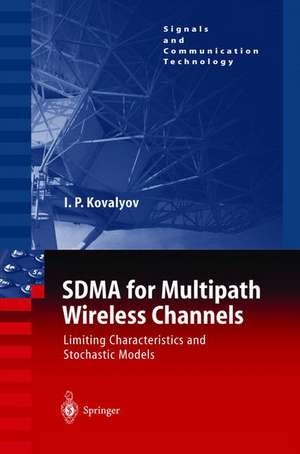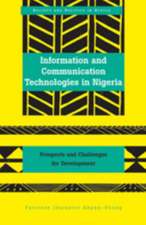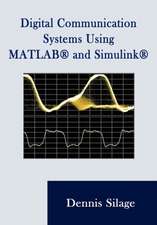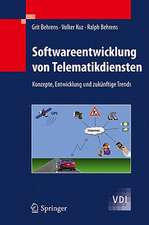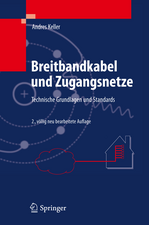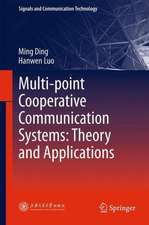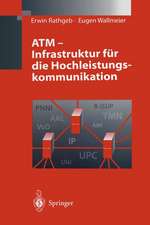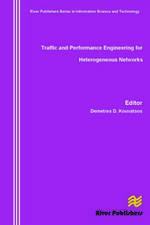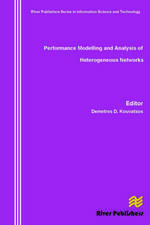SDMA for Multipath Wireless Channels: Limiting Characteristics and Stochastic Models: Signals and Communication Technology
Autor Igor P. Kovalyoven Limba Engleză Hardback – 5 mar 2004
| Toate formatele și edițiile | Preț | Express |
|---|---|---|
| Paperback (1) | 634.68 lei 6-8 săpt. | |
| Springer Berlin, Heidelberg – 5 oct 2012 | 634.68 lei 6-8 săpt. | |
| Hardback (1) | 640.71 lei 6-8 săpt. | |
| Springer Berlin, Heidelberg – 5 mar 2004 | 640.71 lei 6-8 săpt. |
Din seria Signals and Communication Technology
- 18%
 Preț: 952.89 lei
Preț: 952.89 lei - 18%
 Preț: 1559.80 lei
Preț: 1559.80 lei - 17%
 Preț: 361.80 lei
Preț: 361.80 lei - 18%
 Preț: 811.61 lei
Preț: 811.61 lei - 15%
 Preț: 585.26 lei
Preț: 585.26 lei - 18%
 Preț: 727.97 lei
Preț: 727.97 lei - 15%
 Preț: 585.90 lei
Preț: 585.90 lei -
 Preț: 393.35 lei
Preț: 393.35 lei - 20%
 Preț: 1002.72 lei
Preț: 1002.72 lei - 15%
 Preț: 641.71 lei
Preț: 641.71 lei - 20%
 Preț: 338.91 lei
Preț: 338.91 lei - 18%
 Preț: 1579.66 lei
Preț: 1579.66 lei - 18%
 Preț: 896.08 lei
Preț: 896.08 lei - 18%
 Preț: 847.11 lei
Preț: 847.11 lei - 18%
 Preț: 1234.77 lei
Preț: 1234.77 lei - 18%
 Preț: 905.54 lei
Preț: 905.54 lei - 15%
 Preț: 646.43 lei
Preț: 646.43 lei - 20%
 Preț: 662.48 lei
Preț: 662.48 lei - 15%
 Preț: 641.20 lei
Preț: 641.20 lei - 18%
 Preț: 1847.84 lei
Preț: 1847.84 lei - 18%
 Preț: 946.24 lei
Preț: 946.24 lei - 18%
 Preț: 1241.10 lei
Preț: 1241.10 lei - 20%
 Preț: 649.43 lei
Preț: 649.43 lei - 20%
 Preț: 993.28 lei
Preț: 993.28 lei - 18%
 Preț: 940.57 lei
Preț: 940.57 lei - 18%
 Preț: 1389.30 lei
Preț: 1389.30 lei - 20%
 Preț: 1003.50 lei
Preț: 1003.50 lei - 18%
 Preț: 953.52 lei
Preț: 953.52 lei - 20%
 Preț: 1001.16 lei
Preț: 1001.16 lei - 18%
 Preț: 1415.36 lei
Preț: 1415.36 lei - 15%
 Preț: 653.33 lei
Preț: 653.33 lei - 15%
 Preț: 645.60 lei
Preț: 645.60 lei - 15%
 Preț: 637.28 lei
Preț: 637.28 lei - 18%
 Preț: 948.79 lei
Preț: 948.79 lei - 18%
 Preț: 945.62 lei
Preț: 945.62 lei - 18%
 Preț: 836.36 lei
Preț: 836.36 lei - 18%
 Preț: 1230.84 lei
Preț: 1230.84 lei - 15%
 Preț: 635.01 lei
Preț: 635.01 lei - 15%
 Preț: 639.25 lei
Preț: 639.25 lei - 15%
 Preț: 646.30 lei
Preț: 646.30 lei - 15%
 Preț: 639.25 lei
Preț: 639.25 lei - 15%
 Preț: 712.36 lei
Preț: 712.36 lei - 20%
 Preț: 1006.12 lei
Preț: 1006.12 lei - 18%
 Preț: 970.56 lei
Preț: 970.56 lei
Preț: 640.71 lei
Preț vechi: 753.77 lei
-15% Nou
Puncte Express: 961
Preț estimativ în valută:
122.60€ • 128.33$ • 102.04£
122.60€ • 128.33$ • 102.04£
Carte tipărită la comandă
Livrare economică 31 martie-14 aprilie
Preluare comenzi: 021 569.72.76
Specificații
ISBN-13: 9783540402251
ISBN-10: 354040225X
Pagini: 171
Ilustrații: XI, 160 p.
Dimensiuni: 155 x 235 x 17 mm
Greutate: 0.43 kg
Ediția:2004
Editura: Springer Berlin, Heidelberg
Colecția Springer
Seria Signals and Communication Technology
Locul publicării:Berlin, Heidelberg, Germany
ISBN-10: 354040225X
Pagini: 171
Ilustrații: XI, 160 p.
Dimensiuni: 155 x 235 x 17 mm
Greutate: 0.43 kg
Ediția:2004
Editura: Springer Berlin, Heidelberg
Colecția Springer
Seria Signals and Communication Technology
Locul publicării:Berlin, Heidelberg, Germany
Public țintă
ResearchCuprins
1 Introduction.- 1.1 Multielement Antenna Communication Systems in Multipath Wireless Environment.- 1.2 Limit Capacity of a Limited-Size Smart Receiving Antenna Problem Statement.- 1.3 Non-ray Statistical Models of Multipath Wireless Channels.- 1.4 Summary.- 2 Limit Capacity and Statistical Models of Wireless Channels.- 2.1 Limit Capacity of the Two-Dimensional Wireless Channel.- 2.2 Limit Capacity of the Three-Dimensional Wireless Channel.- 2.3 Statistical Model of the Two-Dimensional Omnidirectional Wireless Channel.- 2.4 Statistical Model of the Three-Dimensional Omnidirectional Wireless Channel.- 2.5 Summary.- 3 Capacity of Multiple Input Multiple Output Communication Systems.- 3.1 Decomposition of MIMO Systems.- 3.2 Optimal Power Distribution with Allowance for Thermal Noise and Interference.- 3.3 Crosstalk Effect.- 3.4 Capacity of Systems with Identical Parallel Channels.- 3.5 Summary.- 4 Analysis of the Two-Dimensional Multipath Channel.- 4.1 Representation of the Plane Wave Field by a Fourier Series.- 4.2 Calculation Formulae for Analysis of Two-Dimensional Multipath Wireless Channels.- 4.3 Limit Capacity of the Two-Dimensional Multipath Wireless Channel: Analysis Results.- 4.4 Statistical Model of the Multipath Wireless Channel Based on Polar Solution to Maxwell’s Equation.- 4.5 Summary.- 5 Body of Mathematics for Analysis of Three-Dimensional Multipath Wireless Channels: Spherical Harmonics.- 5.1 Expressing Spherical Three-Dimensional Electromagnetic Fields in Terms of Potentials.- 5.2 Some of the Properties of Spherical Bessel Functions and Associated Legendre Functions.- 5.3 Calculating the Radiant Power of Spherical Harmonics.- 5.4 Numerical Evaluation of Coefficients for Expansion of Electromagnetic Fields into Spherical Harmonics.- 5.5 Expansion of aDipole Field into Spherical Harmonics.- 5.6 Expansion of a Plane Electromagnetic Wave into Spherical Harmonics (downfall).- 5.7 Spherical Harmonics Transformations for Rotation of the Coordinate System.- 5.8 Expansion of the Field of an Arbitrarily Directed Plane Wave into Spherical Harmonics.- 5.9 Summary.- 6 Matrix Element Calculation Formulae for Three-Dimensional Wireless Channels.- 6.1 Calculation of the Channel Matrix Elements in Terms of the Source Wave to Spherical Harmonics Translation.- 6.2 Translation of Plane Waves into Electric and Magnetic Potentials.- 6.3 Calculation of the Channel Matrix Elements in Terms of the Source Wave to Field Components Translation.- 6.4 Summary.- 7 Limit Capacity of the Three-Dimensional Wireless Channel with Potential Antennas.- 7.1 Limiting Characteristics of the Multipath Wireless Channel with a Spherical Receiving Area.- 7.2 Limiting Characteristics of the Three-Dimensional Wireless Channel with a Cylinder-Shaped Receiving Area.- 7.3 Three-dimensional Wireless Channel with a Box-Shaped Receiving Area.- 7.4 Limiting Characteristics of the Three-Dimensional Wireless Channel with Potential Recording Along a Rectilinear Segment.- 7.5 Summary.- 8 Statistical Model of the Three-Dimensional Multipath Wireless Channel.- 8.1 Statistical Properties of the Model Coefficients.- 8.2 Results of the Three-Dimensional Multipath Wireless Channel Modeling.- 8.3 Summary.- Conclusion.
Textul de pe ultima copertă
Space Division Multiple Access (SDMA) is one of the most promising methods in solving the capacity problem of wireless communication systems. In addition to creating more efficient SDMA algorithms it is vital to determine and understand the theoretical limit of performance improvement. The greatest challenge is extending Shannon’s channel capacity equation to cover the wireless channels that use spatial signal processing. This book defines formulas which can be used to evaluate the limit capacity of multipath wireless channels in a particular receiving region with size limitation. It also contains charts with optimum numbers of space subchannels and limit capacities related to radio channel parameters. The book also investigates stochastic models for 2-D and 3-D multipath random radio channels. The non-ray method for building a stochastic model, based on spherical harmonics, is presented here for the first time.
Caracteristici
Deals with the SDMA-technique (Space Division Multiple Access) for cellular radio systems Defines the limits of SDMA in combination with other methods Studies stochastic models for multipath random radio channels
